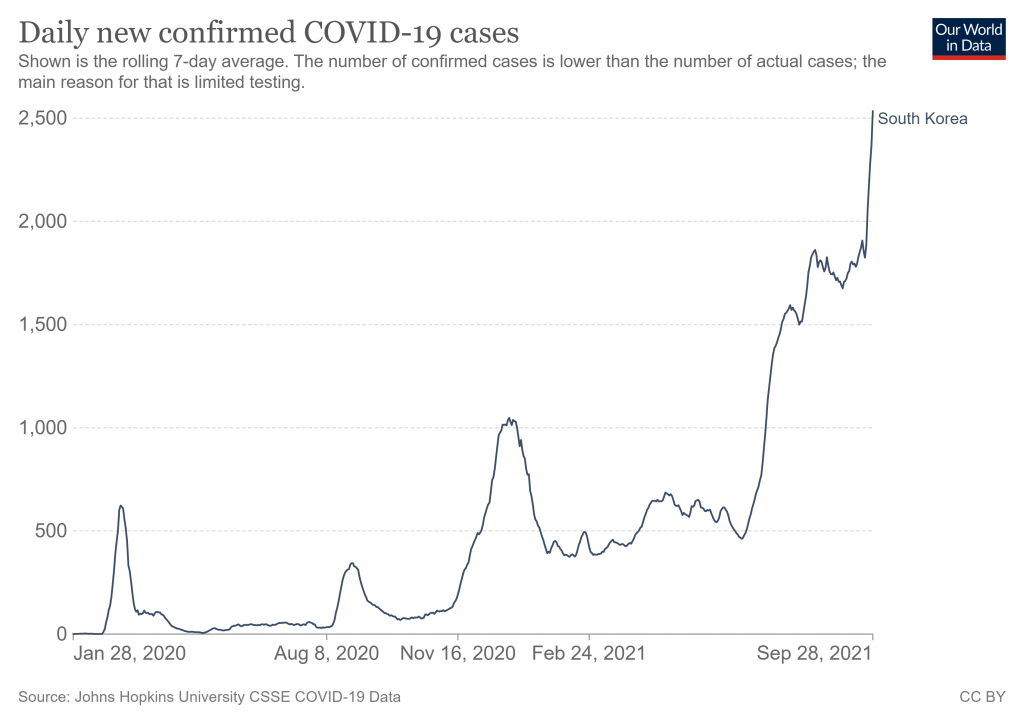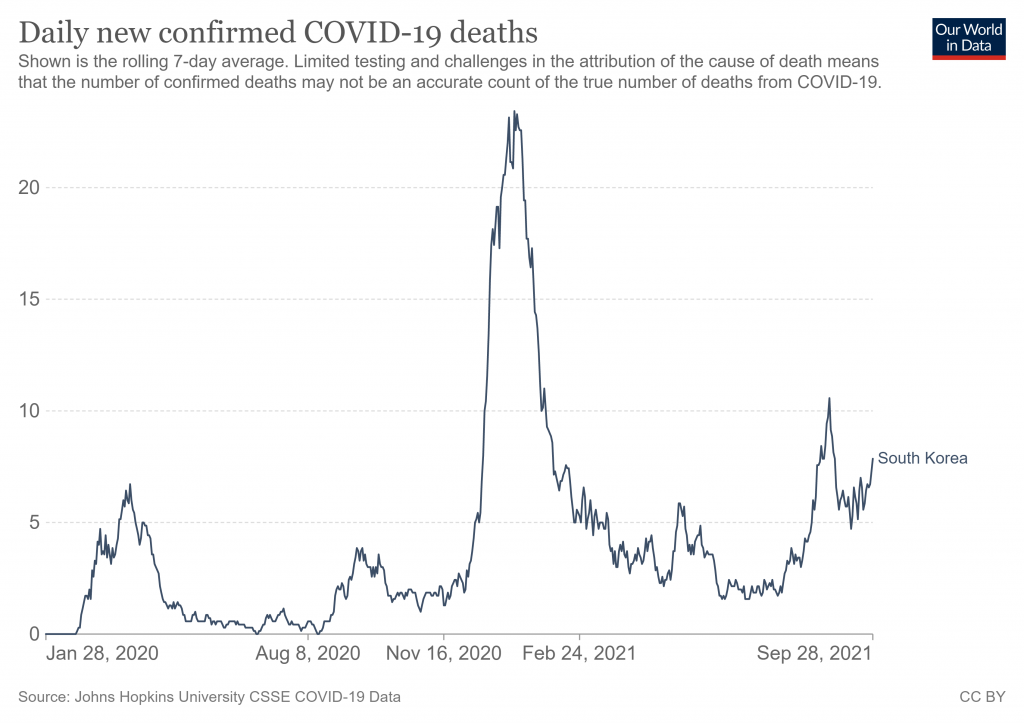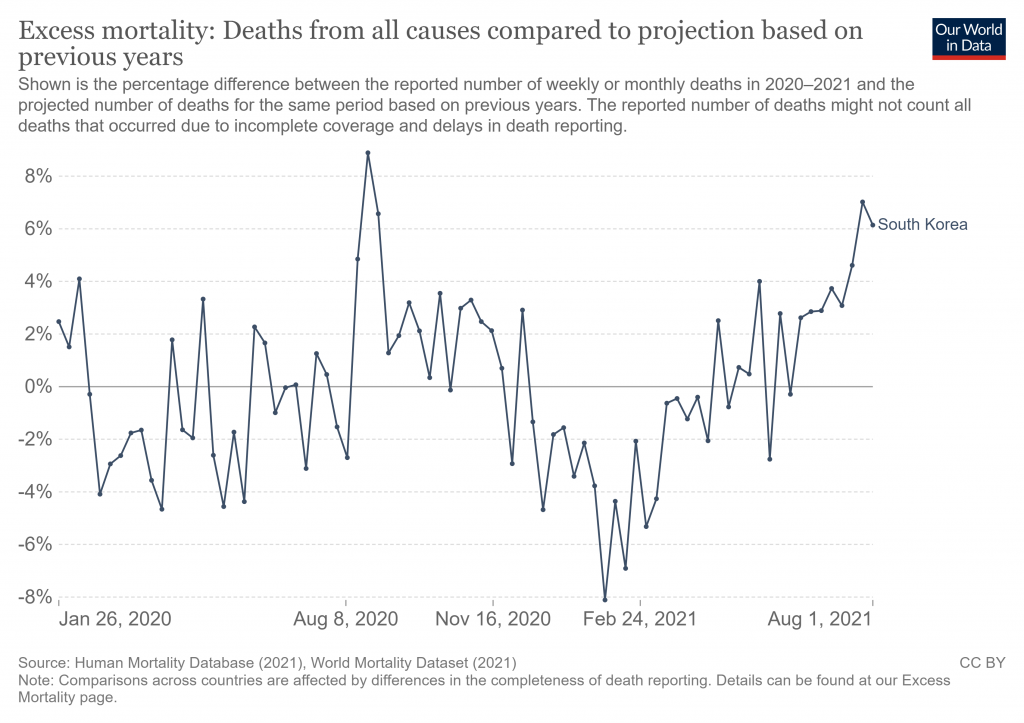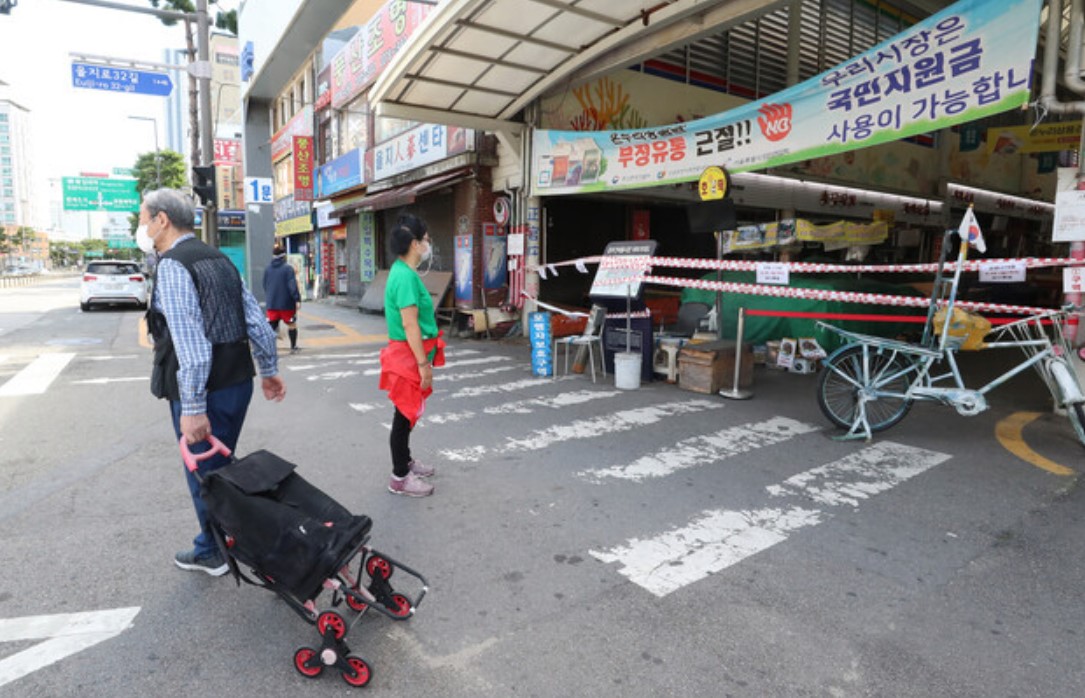In the U.K. we are facing threats once again of restrictions and vaccine passports being imposed over winter should the prospect of an ‘overwhelmed’ NHS be sounded by the Government’s medical advisers in the coming weeks.
But how realistic is this threat of health service ‘collapse’? South Korea is currently providing an object lesson in how the concept appears to be very much in the eye of the beholder.
The South East Asian country has been experiencing a spike in reported infections in recent weeks as the Delta variant has become dominant, hitting over 3,000 in one day for the first time on September 24th.

Three thousand ‘cases’ is very low, of course, compared to our 30,000 or so since early July, and the country is similar in size to the U.K., with a population of 52 million to our 67 million.
While the country does do less testing, deaths are also very low, with daily confirmed deaths currently between just five and 10 a day.

Excess mortality has also remained low throughout the pandemic, currently sitting at around 6% having been negative over the winter.

Despite these enviable Covid stats, though, the country is currently living under various Covid restrictions and the Government has said that while it plans to reopen, it will reverse course should ‘cases’ go above 4,000 per day. Why? According to the Government’s Minister of Health, Kwon Deok-cheol, the South Korean “healthcare system would not be able to cope with 4,000 or 10,000 new confirmed cases per day”.
At a Korea Broadcasting Journalists Club roundtable on Tuesday, Minister of Health and Welfare Kwon Deok-cheol said that South Korea’s medical response system would be “sufficiently capable” of handling a daily caseload of 3,000 or more confirmed cases and that the country would be able to proceed with a gradual return to everyday life, provided that the Government’s late-October targets of fully vaccinating 80% of adults and 90% of senior citizens are met.
He also said that the shift toward a “living with Covid” approach was not hasty, noting that while the U.K. began its gradual return to normal life while its full vaccination rate was just 1.6%, whereas South Korea had a full vaccination rate of 46.6% as of Tuesday.
But he also noted that observation of basic disease prevention guidelines such as wearing masks indoors and regularly ventilating indoor spaces would remain necessary, saying that “our healthcare system would not be able to cope with 4,000 or 10,000 new confirmed cases per day.”
“For that reason, we are considering a phased easing [of restrictions] – based on business types, for example – rather than a full-scale elimination [of said restrictions],” he added.
Vaccine passports are also being considered, apparently in order to protect the unvaccinated.
The South Korean government similarly explained that with the 976 critical care beds and 10,212 beds for patients with moderate symptoms that it had secured as of Tuesday, the South Korean healthcare system would be able to cope with as many as 3,500 new confirmed cases per day.
In addition to relaxing restrictions on private gatherings for fully vaccinated people and gradually removing restrictions on the use of multipurpose facilities, Kwon also said consideration was being given to the adoption of “vaccine passes,” where only fully vaccinated people or other restricted categories of people would be allowed to use certain establishments during the initial stages of the gradual return to everyday life.
He went on, saying that Germany grants permission for indoor events or use multipurpose facilities such as hospitals, long-term care facilities, nightlife establishments, and cinemas only to people who present a pass that certifies they have been either fully vaccinated, have tested negative for Covid, or have fully recovered from a previous Covid infection.
“With confirmed cases currently being observed among unvaccinated people – many of them leading to critical symptoms and even death – we are considering applying such an approach, if only to protect these people,” he said.
I have to say it is bizarre to read the same worries about ‘cases’ getting too high and putting unsustainable pressure on the health service in a country which is experiencing a fraction of our reported infections and an even smaller fraction of our deaths. How can we take this seriously when South Korea has more than three times the number of hospital beds that the U.K. has, 10 per 1,000 population compared to three per 1,000?
Nations whether in the East or West are now being held hostage by their health services and their supposed capacity to cope with coronavirus surges. But it’s clear from the very different scales of these supposed capacity threats in different countries that this spectre of an overwhelmed and collapsing health service is largely a figment of the political imagination.
No doubt a winter Covid wave can stretch a health service considerably. But if even England in January had thousands of empty hospital beds on January 18th, when the number of Covid hospital patients hit 39,254, and did not ‘collapse’ (and the Nightingale hospitals remained empty), then it’s difficult to see how the threat is in any way a realistic one. At that winter peak, Covid patients occupied less than a third of the total hospital beds (31%), while 8,696 beds remained unoccupied. Besides which, if winter hospital capacity is the crucial issue for lockdowns and other measures, would it not be a whole lot cheaper and more effective just to boost it more?
Lockdown proponents will claim that the U.K. winter wave was mitigated by restrictions. But the truth is the U.K. suffered one of the biggest winter surges in the world, regardless of what measures were in place in other countries. States in America with few or no restrictions such as Florida and South Dakota, and light-touch Sweden, did not suffer worse winters. There is thus nowhere that lockdown proponents can point to and say, look, that’s what would have happened here if we hadn’t locked down. There is no reason to think that without restrictions the U.K.’s winter surge would have ended up much worse.
While governments around the world continue to hold the threat of an overwhelmed health service over their populations as a kind of political blackmail (albeit often sincerely believed), the experience of South Korea shows that the threat is ill-defined, largely illusory, and not a sound basis for imposing illiberal measures and ruinous restrictions.












To join in with the discussion please make a donation to The Daily Sceptic.
Profanity and abuse will be removed and may lead to a permanent ban.